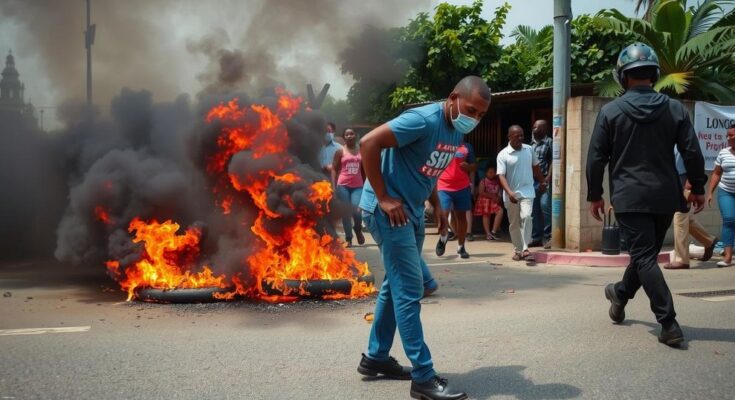Mozambique has plunged into chaos following Frelimo’s election victory amid allegations of fraud, resulting in significant urban riots, 278 reported deaths since October, and severe disruptions to daily life and the economy. A massive prisoner escape and protests targeting both local and foreign businesses exacerbate an already tense situation that continues to unfold in the capital, Maputo.
Following the confirmation of the ruling party Frelimo’s victory in Mozambique’s October 9 election, the nation has descended into chaos characterized by widespread post-election violence. Despite holding power for 50 years, Frelimo has faced significant opposition claims of electoral fraud, leading to urban riots that have resulted in the deaths of at least 278 individuals since the election, with 176 fatalities reported in a recent week alone. The situation in the capital, Maputo, has deteriorated, becoming the epicenter of the unrest, as citizens protest against perceived injustices while deprived of adequate safety measures.
Amidst the confusion, widespread vandalism and looting have disrupted daily life. Scenes reported include burning ambulances and disrupted access to essential goods, as shops and bakeries close amidst fear of violence. Supply chain disruptions due to ongoing protests are causing inflation, severely affecting basic commodity prices. In a unique turn, over 1,500 prisoners escaped from Maputo’s central prison on Christmas Day, with a significant number still unaccounted for, exacerbating an already tense security climate.
Daniel Chapo, the elected president, urged for unity and non-violence, while opposition leader Venancio Mondlane accused the security forces of complicity amid the chaos. Observers have noted irregularities in the recent electoral process, further inflaming public sentiment against Frelimo. As strikes have targeted both local and foreign businesses, the economic implications are stark; an estimation of nearly $430 million in damages from unrest has been projected, marking a significant downturn for the economy amidst an unfolding humanitarian crisis.
The post-election violence in Mozambique comes in the wake of the October 9, 2023, elections where the ruling party, Frelimo, secured its victory amidst allegations of widespread electoral fraud. This ongoing turmoil has led to heightened social unrest, with opposition supporters challenging the legitimacy of the election results. The tension has been compounded by an atmosphere of fear and instability, as individuals respond to the perceived injustices perpetrated by the ruling authorities, leading to severe consequences for public safety and the economy.
In conclusion, Mozambique currently faces a severe crisis following its recent elections, characterized by violence, protests, and a deteriorating economy. The aftermath of allegations surrounding electoral fraud has resulted in a loss of life and significant civil unrest, disrupting daily life in the capital and beyond. The government’s struggle to maintain order amidst the chaos highlights the broader implications of political discontent, further complicating the nation’s socio-economic landscape.
Original Source: international.la-croix.com




